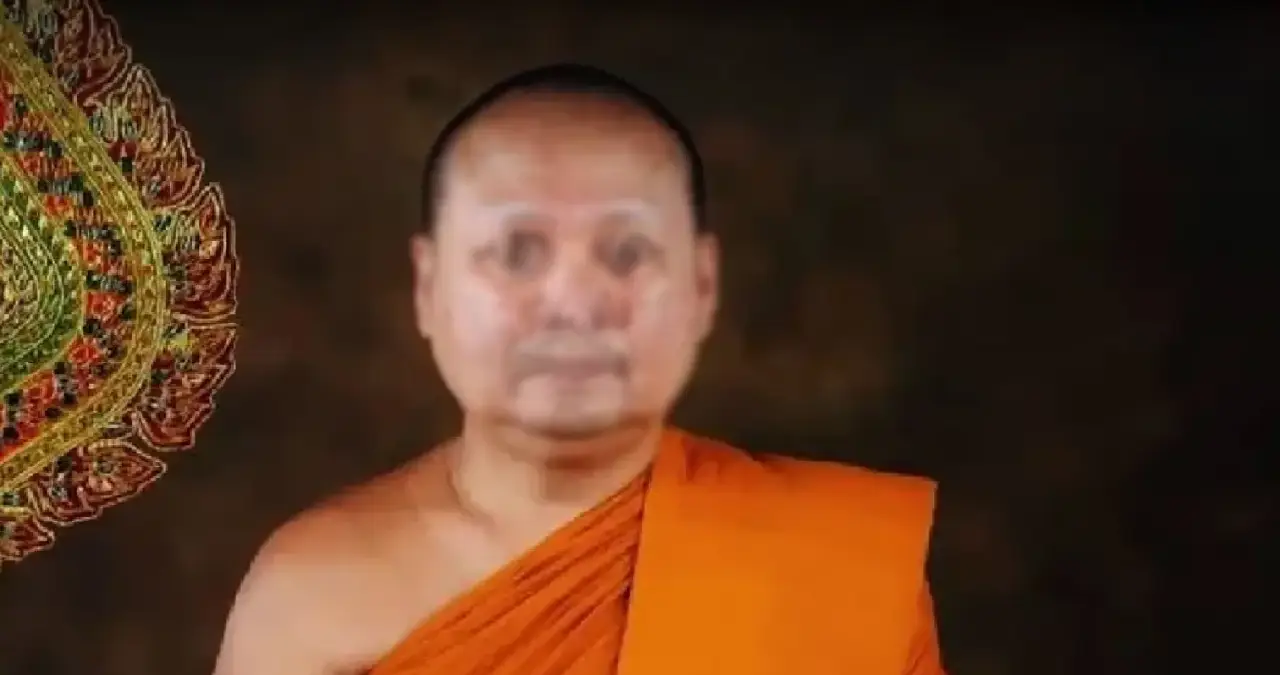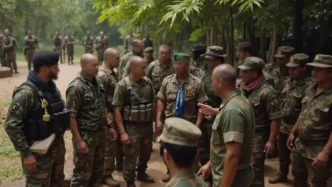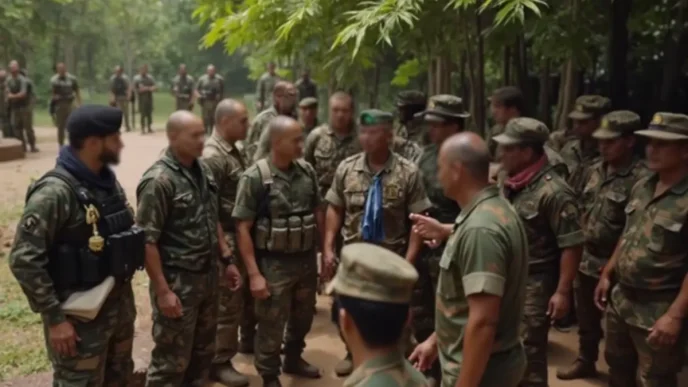In a striking development that has sent ripples through Thailand’s Buddhist community, the abbot of one of Bangkok’s most revered temples, Wat Tri Thotsathep Worawihan, has reportedly fled to Laos after stepping down from his monastic position. Phrathep Wachirapamok, widely known as Chaokhun Arj, left the monkhood on June 27 amid mounting allegations of embezzlement, as anti-corruption authorities sought to question him over claims of misappropriating temple funds.
A Prominent Figure Under Scrutiny
Wat Tri Thotsathep, a historic temple under royal patronage in the heart of Bangkok, belongs to the Dhammayut Nikaya order, a strict and influential sect of Thai Buddhism. Chaokhun Arj, aged 54, had been regarded as a rising star within the order, having ascended to the position of abbot in 2022. His tenure at the temple, whose name translates to “The Temple Built by Three Deities” in reference to its founding by King Rama IV and two princes, had been marked by growing influence and potential for further promotion in the monastic hierarchy.
However, his reputation came under intense scrutiny following a tip-off to Thailand’s anti-corruption bodies. Officers from the Anti-Corruption Division of the Central Investigation Bureau, alongside representatives from the National Anti-Corruption Commission (NACC) and the Public Sector Anti-Corruption Commission (PACC), moved to investigate allegations that the abbot had siphoned funds from the temple. Sources suggest that Chaokhun Arj declined to meet with investigators, choosing instead to quietly resign from the monkhood in Nong Khai province, near the Thai-Lao border.
Reports indicate that he crossed into Laos at 9:08pm on June 27, effectively evading questioning. While the exact reasons for his departure remain unclear, an alternative theory has emerged among investigators. Some speculate that the former abbot may have been under pressure from external forces, with police exploring the possibility of blackmail involving an unidentified woman. No concrete evidence has yet surfaced to substantiate this claim, and authorities have urged caution in drawing conclusions.
A Pattern of Allegations in Thai Temples
Chaokhun Arj’s case is not an isolated incident. Just a month prior, in May, the abbot of Wat Rai Khing in Nakhon Pathom province was defrocked and charged with embezzling over 300 million Thai Baht (US$8.4 million, based on exchange rates as of late June 2025) from temple coffers. The recurrence of such allegations against senior monks has sparked renewed debate over accountability and financial transparency within Thailand’s Buddhist institutions, which play a central role in the country’s cultural and social fabric.
Temples in Thailand often manage significant donations from devotees, funds that are intended for religious activities, community welfare, and temple maintenance. However, the lack of stringent oversight has, in some instances, led to accusations of mismanagement or outright corruption. The Dhammayut order, to which Wat Tri Thotsathep belongs, is known for its rigorous adherence to monastic discipline, making these allegations particularly jarring to many followers.
In the wake of Chaokhun Arj’s departure, Phraprom Wachirarangsi, the monastic chief of the Dhammayut Nikaya order in Bangkok, has been appointed as the acting abbot of Wat Tri Thotsathep. His interim leadership is expected to provide stability as the temple navigates this tumultuous period, though the broader implications for public trust in religious institutions remain uncertain.
Public Reaction and Cultural Implications
The news of Chaokhun Arj’s flight has elicited a range of reactions from the Thai public. For many, Buddhism is not only a spiritual anchor but also a cornerstone of national identity, and allegations against senior monks are often met with a mix of disbelief and disappointment. On social media platforms like X, users have expressed concern over the potential erosion of trust in temple leadership, with some calling for stricter regulations on temple finances. Others, however, have urged restraint, emphasizing the need to await the outcome of the investigation before passing judgment.
“It’s heartbreaking to see such news about a respected figure” said Somchai Kittisak, a 62-year-old Bangkok resident who has visited Wat Tri Thotsathep for decades. “But we must remember that everyone deserves a fair chance to explain themselves.”
The cultural significance of Wat Tri Thotsathep adds another layer of complexity to the situation. As a temple with deep royal connections, it holds a special place in Thai history and tradition. Its origins trace back to the 19th century, when it was initiated by Prince Witsanunart Nipha Thorn, continued by Prince Mahesuan Siwailat, and completed under the reign of their father, King Rama IV. The temple’s name reflects the reverence for these royal figures, often regarded as deities in Thai tradition, underscoring its symbolic importance.
Legal and Political Dimensions
From a legal standpoint, the case raises questions about the enforcement of anti-corruption measures within religious institutions. Thailand’s anti-corruption framework, including bodies like the NACC and PACC, has been active in addressing graft across public and private sectors. However, applying these mechanisms to monastic figures presents unique challenges, given the cultural sensitivities surrounding Buddhism and the clergy’s traditional autonomy.
If Chaokhun Arj remains in Laos, Thai authorities may face difficulties in pursuing the investigation. While Thailand and Laos share a history of cooperation on cross-border issues, the extradition of individuals in such cases is not guaranteed, particularly if the allegations are still under preliminary investigation. Legal experts suggest that the Thai government may need to work through diplomatic channels to seek clarity on the former abbot’s status, though no official statements have been made regarding such efforts.
Politically, the incident could fuel ongoing discussions about the intersection of religion and governance in Thailand. The country has seen periodic tensions over the role of the Buddhist clergy in public life, with some advocating for greater state oversight of temple affairs, while others argue that such measures risk undermining religious independence. The government, already navigating a complex political landscape, may find itself under pressure to address these concerns without alienating key religious communities.
Regional Context and Broader Implications
The allegations against Chaokhun Arj also resonate within a broader regional context. Across Southeast Asia, religious institutions often wield significant social influence, and cases of alleged misconduct can have far-reaching consequences. In neighboring Myanmar, for instance, Buddhist monks have historically played a prominent role in political movements, while in Cambodia, temples have been central to post-conflict reconciliation efforts. Instances of corruption or scandal within these institutions can undermine their moral authority, affecting their ability to serve as community pillars.
In Thailand, where over 90% of the population identifies as Buddhist, the stakes are particularly high. The Sangha Supreme Council, the governing body of Thai Buddhism, has faced criticism in the past for its handling of disciplinary issues among monks. While the council has yet to comment on Chaokhun Arj’s case, its response could shape public perceptions of its commitment to addressing internal challenges.
Moreover, the financial scale of some of these allegations—such as the 300 million Thai Baht reportedly embezzled by the abbot of Wat Rai Khing—highlights the economic dimensions of temple management. Temples often serve as economic hubs in their communities, supporting local vendors, schools, and charitable initiatives. Any misuse of funds can thus have a ripple effect, impacting not just spiritual trust but also tangible community welfare.
Looking Ahead
As the investigation into Chaokhun Arj’s actions continues, many questions remain unanswered. What motivated his sudden departure to Laos, and will he return to face the allegations? How will the Thai Buddhist community, and the Dhammayut order in particular, respond to this second high-profile case in as many months? And perhaps most critically, can Thailand’s religious and legal institutions find a balance between preserving cultural reverence and ensuring accountability?
For now, Wat Tri Thotsathep stands at a crossroads, its storied history overshadowed by modern-day controversy. As authorities and the public alike await further developments, the incident serves as a reminder of the delicate interplay between faith, power, and responsibility in one of Southeast Asia’s most deeply spiritual nations.















